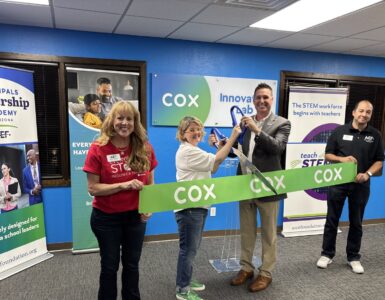In the 1970-1971 academic year, Education was the top bachelor’s degree in the United States. In the 2016-2017 academic year, Business took the lead as number one.
“Persistent concerns about the cost and benefit of a university degree have driven many students to study in fields that have direct applications,” Steven Taylor, W.P. Carey’s associate dean of graduate programs said.
According to a National Center for Education Statistics report, there were nearly 2 million bachelor’s degrees awarded in the 2016-2017 school year. The top ten were business; health professions and related programs; social sciences and history; psychology; biological and biomedical sciences; engineering; communication, journalism and related programs; visual and performing arts; education; and computer and information sciences.
“I think it’s because of the job prospects,” said Dan Goebel, Dean of the Northern Arizona University Franke College of Business. “There’s a lot that gets done in science and humanities and engineering… [but] business principles are needed in all of those areas and I think it’s people who have that background knowledge… I think somebody who has that background can jump into a job anywhere.”
Of the almost 2 million bachelor’s degrees attained in the academic school year, 381,353 were in business.
The Franke College of Business has seen a 40 percent growth since 2012, Goebel said. According to numbers from NAU, in 2014 there were 2,194 business undergraduates and in 2018 there were 3,396.
“As the nation’s largest undergraduate school of business, we have seen our numbers grow dramatically over the last decade, with enrollment growing in double-digit percentages each year for several years,” Taylor said.
At Arizona State University, W.P Carey had a total enrollment of 13,555 students in fall 2017. In the 2016-2017 school year, almost 3,000 of those students were first-time, full-time freshmen and 84.9 percent continued on at the university.
The University of Arizona reports that the Eller College of Management has 5,440 undergraduate students.
“I see it growing, I see that there’s a lot more interest in getting a business-related degree than in previous years,” said Dean of Eller College of Management Paulo Goes. “I actually contribute that to what happened in the Great Recession of 2008… [because] there is that pragmatic sense of going and getting a [business] major.”
More than half of all students at all three schools report being employed after graduation— NAU with 74 percent, ASU with 95.9 percent and UA with 86 percent — and according to them what makes their schools unique is the access to a multifaceted business major.
“There’s going to be more [specialization] than there has been recently,” Goebel said. “It’s going to be incumbent upon business college deans to recognize where the trends are and to also prepare students to fill those trends. I think one of the things that’s going to be really important going forward is colleges of business collaborating with other colleges on campus to provide unique degree programs that are going to help students fulfill certain niches.”
Goes added that it’s important to add a professional development component to the degree.
“At the Eller College we have spent a lot of effort and focus on providing that professional development. Teaching the student how to learn in a professional environment and also we have career culture that helps them secure internships and full-time jobs,” Goes said. “You have to have that component so that the students [will] feel comfortable that if they apply themselves, they’ll get a job.”
According to Taylor, business can spark the interest of students and W.P. Carey is designed to encourage and support the spark of interest and learning.
“Business is the paradigmatic discipline for change: the pace of change in the business sector is constantly increasing, and so relevant training has to be developed to meet these needs,” Taylor said. “Programs still focus on providing the core critical thinking and analytic frameworks, but there have been many new offerings to cover entrepreneurship, Big Data and data analytics, sustainability, social enterprise management, agribusiness, and many, many others.”
According to Heidi Tworek, assistant director of undergraduate studies in the History Department at Harvard University, the change in degree attainment started in the 1970s when women began entering college in record numbers.
“From the mid-1990s onwards, women have earned more than 50 percent of bachelor’s degrees in pre-professional subjects. There’s still no concrete answer about why this happened,” Tworek wrote.
As the industry changes, Goebel, Goes and Taylor said that business schools will continuously need to adapt to fit certain niches.
“I think there’s exciting times ahead and if I could go back and be a business major again I would definitely [do it] because I think the future’s so bright and so vast and the possibilities are going to be a great opportunity for young people,” Goebel said.
“We have to also think about education after the bachelor’s degree because as things keep changing there is always going to be a demand for life long education and we need to think about the graduate programs, graduate certificates… and be equipped to provide that kind of education to society,” Goes said.
“There is a growing need to envision a college or university not as a place where the discrete event of a degree takes place, but rather as a platform for lifelong learning where researchers and practitioners regularly host courses for those that need specific training. The degree will always provide a qualified foundation, but those in the ever-changing world of business are taking note that training does not stop once a degree has been awarded and are seeking new platforms and interactions that can help them take on the challenge,” Taylor said.
To view the National Center for Education Statistics data, click here.
















Add comment